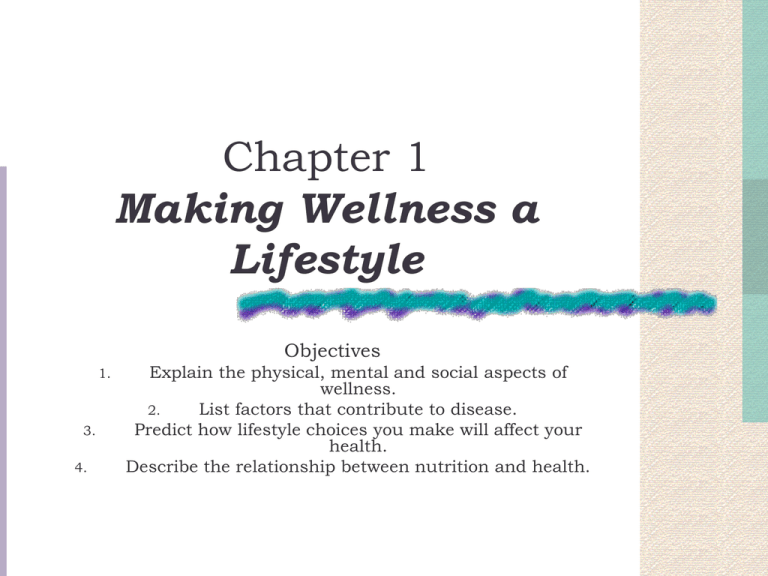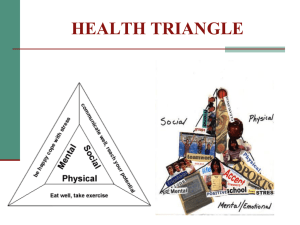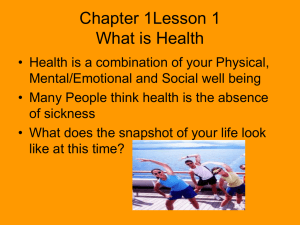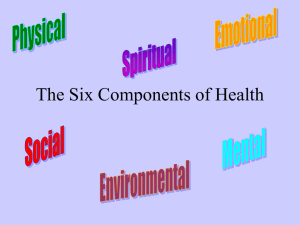Chapter 1 Making Wellness a Lifestyle
advertisement

Chapter 1 Making Wellness a Lifestyle Objectives 1. 3. 4. Explain the physical, mental and social aspects of wellness. 2. List factors that contribute to disease. Predict how lifestyle choices you make will affect your health. Describe the relationship between nutrition and health. Introduction What are some factors that influence teens’ health-related choices? What are some specific ways teenagers can learn to increase individual responsibility for healthrelated choices? Activity Worksheet: Lifestyle Assessment (10 minutes) Discussion What Does Wellness Mean? wellness: state of being in good health quality of life: a person’s satisfaction with his/her looks, lifestyle and responses to daily events When people are in good health: •they have a desire to stay fit and live a healthy lifestyle When people are not in good health: •they are energetic and have an enthusiastic outlook •they are able to successfully meet the challenges of each day •life’s events become harder to manage •there is a decrease in the quality of life The Wellness Continuum You can use a continuum to define your personal state of wellness. premature death: death that occurs due to lifestyle behaviors that lead to fatal accident or the formation of an avoidable disease optimum health: a state of wellness characterized by peak physical, mental and social well-being Your health status determines your place along the wellness continuum. The Wellness Continuum Premature Death Optimum Health low energy level moderate energy level high energy level frequent illness some illness infrequent illness and quick recovery from illness inferior stress management skills average stress management skills superior stress management skills poor social relationships fair social relationships excellent social relationships Objectives 1. Explain the physical, mental and social aspects of wellness. 2. List factors that contribute to disease. 3. Predict how lifestyle choices you make will affect your health. 4. Describe the relationship between nutrition and health. Review What is the difference between wellness and quality of life? What causes premature death? What are some characteristics of optimum health? Activity Worksheet: Lifestyle Choices for Wellness (10-15 minutes) Three Major Components of Wellness Physical Health •fitness of your body What factors can harm your physical health? Social Health •the way you get along with others •related to understanding and accepting roles Mental Health •related to the way you feel about yourself, your life and the world around you How can you improve your mental health? Holistic Approach to Wellness holistic medicine: an approach to health care that focuses on all aspect of patient care—physical, mental and social Physical Health W E L L N E S S Mental Health Social Health Factors that Affect Wellness Why is it important to recognize the impact of health-related issues in the teen years? Your present actions and attitudes are shaping the person you will become in the future Factors that Contribute to Disease risk factor: a characteristic or behavior that influences a person’s chance of getting a disease •unhealthy lifestyle choices •poor environmental quality •inadequate health care •heredity Factors that Contribute to Disease—Unhealthy Lifestyle Choices Three major causes of death among adults: •heart disease •cancer •stroke **the CDC estimates lifestyle choices account for about half the factors contributing to these diseases Unhealthy lifestyle choices: •nutrition •stress management •exercise Factors that Contribute to Disease—Poor Environmental Quality environmental quality: the state of the physical world around you Includes the safety of: •the water you drink •the air you breath •the food you eat Factors that Contribute to Disease—Inadequate Health Care •accounts for about 10% of the risk factors that contribute to leading causes of death Causes of inadequate health care: •failure to diagnose, or recognize, a disease early enough •lack of specialists or equipment at health care facilities •poorly managed facilities •improperly given treatments •failure to get check-ups •lack of health insurance or money to pay for treatment Factors that Contribute to Disease—Heredity •accounts for 25% of the factors that contribute to the leading causes of death •beyond your control (genetics) How can you combat heredity? Health-Promoting Choices You have control over the factors that influence your health. Experts have identified certain behaviors that make a difference in people’s quality of life. •choose a healthy lifestyle •resist negative peer pressure •improve your environment •choose quality health care Health-Promoting Choices: Choose a Healthy Lifestyle diet: all the foods and beverages you consume Healthy lifestyle practices: •provide your body with fuel throughout the day by eating 3 or more regularly spaced meals, including breakfast •sleep 8-9 hours each night •maintain a healthy weight •exercise most days of the week for at least 20 minutes •do not smoke •avoid drinking alcoholic beverages •do not use street drugs Health-Promoting Choices: Resist Negative Peer Pressure peer pressure: the influence people in your age and social group have on your behavior How to combat negative peer pressure: •self-confidence •strong enough to say “no” to what you consider to be a poor choice Health-Promoting Choices: Improve Your Environment •carpool or take public transportation to avoid polluting the air with car exhaust •use cleaning products that will not pollute water supplies •handle food carefully to avoid contamination that can cause illness Health-Promoting Choices: Choose Quality Health Care •select a physician who specializes in your particular health care needs •choose facilities that have a reputation for offering quality health care •see your doctor for regular checkups •seek your doctor’s advice when first noticing a health problem •when you visit your doctor, describe your symptoms accurately and completely Making a Change Changing one behavior can affect all aspects of your health. Worksheet: My Plan for Wellness and Behavior Change Contract (15-20 minutes) Objectives 1.Predict how lifestyle choices you make will affect your health. 2.Describe the relationship between nutrition and health. Review Name some healthy lifestyle choices? Define the following: What are some factors that contribute to disease? •physical health •mental health •social health Describe some characteristics of quality health care. Nutrition and Wellness One factor shown to have a big impact on wellness is nutrition. nutrition: the sum of the processes by which a person takes in food and uses food substances nutrients: the basic components of food that nourish the body •eating specific foods cannot cause or prevent certain diseases •following certain eating patterns tends to increase or decrease a person’s chance of illness Evaluating Research Reports •studies should be replicated •examine what’s in a research article •who speaks on nutrition must be reliable (e.g., doctors, registered dieticians) •when looking at nutrition claims, ask: •is if from a peer review journal? •does the report describe purpose, method & limitations? •what was the type of population studied? •has there been previous research? •does it make common sense? Evaluating Research Reports A single study is not a sufficient basis for recommending changes in behavior. Activity In lab groups, complete worksheet: Evaluating Health and Nutrition Information (20-25 minutes) Objectives 1.Predict how lifestyle choices you make will affect your health. 2.Describe the relationship between nutrition and health. Review What are some things to keep in mind when evaluating research reports? What is the difference between nutrition and nutrients? Healthy Eating in the U.S. Do you think that people in the U.S. are eating as well as they should? Nutrition problems affecting the nation’s state of wellness: •about one-third of the people in the U.S. eat an inadequate diet •1 out of 3 adults is overweight; 1 out of 4 is more than 20% overweight •popular lifestyles include less and less exercise •important nutrients are missing from the diets of some groups of people, such as teens and older adults •fat, cholesterol, sodium and sugar intake are higher than recommended Healthy Eating in the U.S. Why do you think some of these problems arise? Reasons for nutrition problems in the U.S.: •not have enough money to acquire adequate nutrition •lack of information and skills needed to select a nutritious diet •some people may not know they need to make changes •some people ignore current nutrition recommendations The Benefits of Healthy Eating life expectancy: the average length of life of people living in the same environment Life expectancy in the U.S. is over 70 years. Activity Use the remainder of the class period to complete the review.









